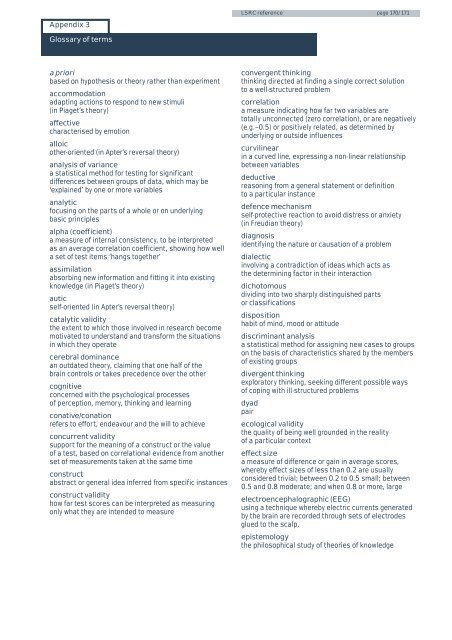learning-styles
learning-styles
learning-styles
Create successful ePaper yourself
Turn your PDF publications into a flip-book with our unique Google optimized e-Paper software.
Appendix 3<br />
Glossary of terms<br />
LSRC reference<br />
page 170/171<br />
a priori<br />
based on hypothesis or theory rather than experiment<br />
accommodation<br />
adapting actions to respond to new stimuli<br />
(in Piaget’s theory)<br />
affective<br />
characterised by emotion<br />
alloic<br />
other-oriented (in Apter’s reversal theory)<br />
analysis of variance<br />
a statistical method for testing for significant<br />
differences between groups of data, which may be<br />
‘explained’ by one or more variables<br />
analytic<br />
focusing on the parts of a whole or on underlying<br />
basic principles<br />
alpha (coefficient)<br />
a measure of internal consistency, to be interpreted<br />
as an average correlation coefficient, showing how well<br />
a set of test items ‘hangs together’<br />
assimilation<br />
absorbing new information and fitting it into existing<br />
knowledge (in Piaget’s theory)<br />
autic<br />
self-oriented (in Apter’s reversal theory)<br />
catalytic validity<br />
the extent to which those involved in research become<br />
motivated to understand and transform the situations<br />
in which they operate<br />
cerebral dominance<br />
an outdated theory, claiming that one half of the<br />
brain controls or takes precedence over the other<br />
cognitive<br />
concerned with the psychological processes<br />
of perception, memory, thinking and <strong>learning</strong><br />
conative/conation<br />
refers to effort, endeavour and the will to achieve<br />
concurrent validity<br />
support for the meaning of a construct or the value<br />
of a test, based on correlational evidence from another<br />
set of measurements taken at the same time<br />
construct<br />
abstract or general idea inferred from specific instances<br />
construct validity<br />
how far test scores can be interpreted as measuring<br />
only what they are intended to measure<br />
convergent thinking<br />
thinking directed at finding a single correct solution<br />
to a well-structured problem<br />
correlation<br />
a measure indicating how far two variables are<br />
totally unconnected (zero correlation), or are negatively<br />
(e.g.–0.5) or positively related, as determined by<br />
underlying or outside influences<br />
curvilinear<br />
in a curved line, expressing a non-linear relationship<br />
between variables<br />
deductive<br />
reasoning from a general statement or definition<br />
to a particular instance<br />
defence mechanism<br />
self-protective reaction to avoid distress or anxiety<br />
(in Freudian theory)<br />
diagnosis<br />
identifying the nature or causation of a problem<br />
dialectic<br />
involving a contradiction of ideas which acts as<br />
the determining factor in their interaction<br />
dichotomous<br />
dividing into two sharply distinguished parts<br />
or classifications<br />
disposition<br />
habit of mind, mood or attitude<br />
discriminant analysis<br />
a statistical method for assigning new cases to groups<br />
on the basis of characteristics shared by the members<br />
of existing groups<br />
divergent thinking<br />
exploratory thinking, seeking different possible ways<br />
of coping with ill-structured problems<br />
dyad<br />
pair<br />
ecological validity<br />
the quality of being well grounded in the reality<br />
of a particular context<br />
effect size<br />
a measure of difference or gain in average scores,<br />
whereby effect sizes of less than 0.2 are usually<br />
considered trivial; between 0.2 to 0.5 small; between<br />
0.5 and 0.8 moderate; and when 0.8 or more, large<br />
electroencephalographic (EEG)<br />
using a technique whereby electric currents generated<br />
by the brain are recorded through sets of electrodes<br />
glued to the scalp.<br />
epistemology<br />
the philosophical study of theories of knowledge


